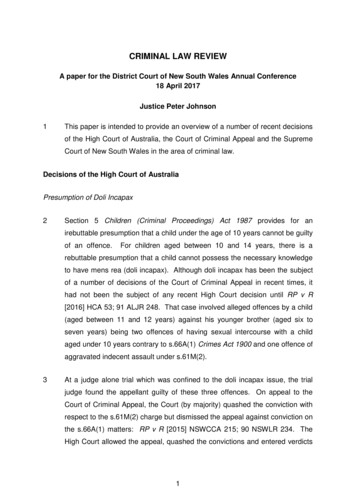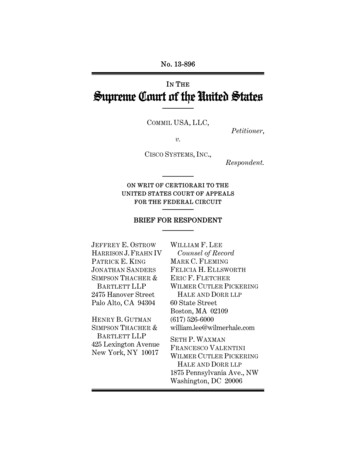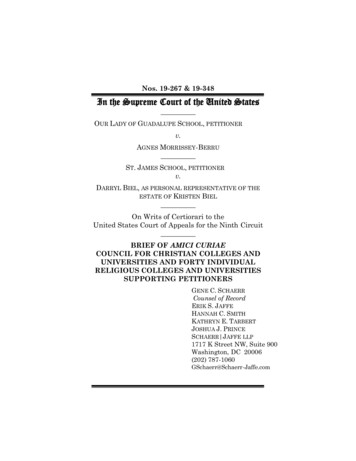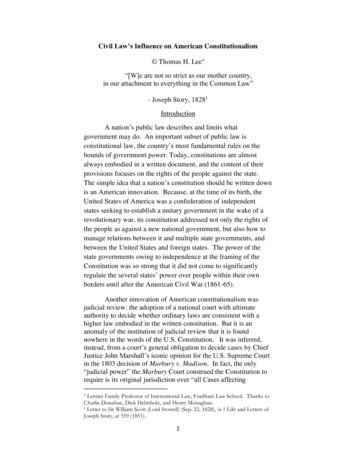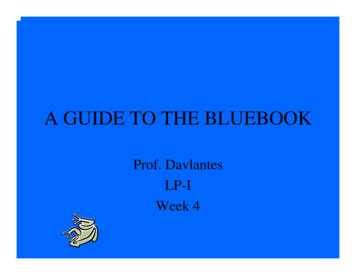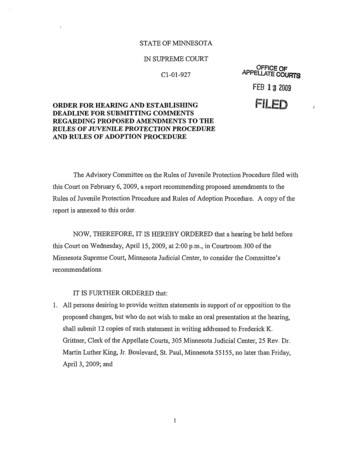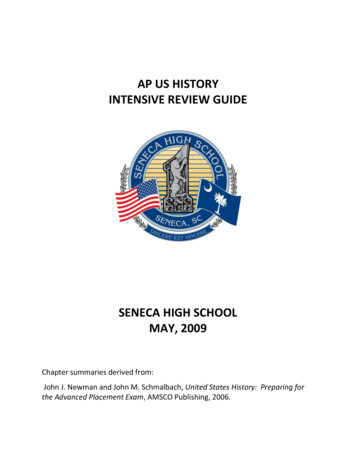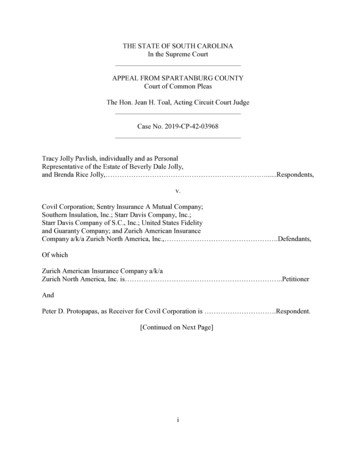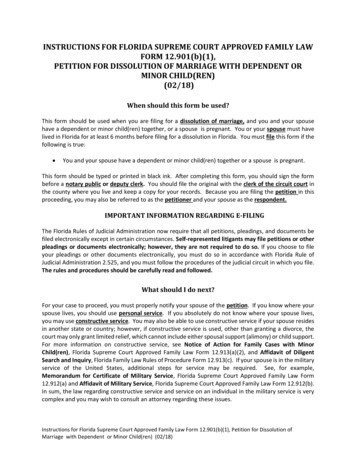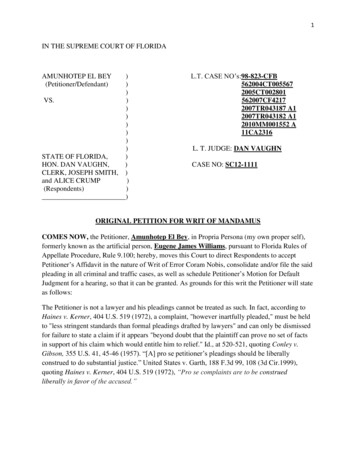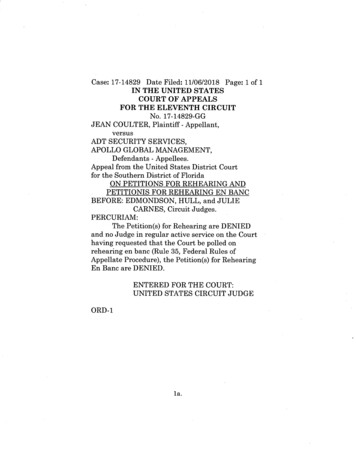
Transcription
Case: 17-14829 Date Filed: 11/06/2018 Page: 1 of 1IN THE UNITED STATESCOURT OF APPEALSFOR THE ELEVENTH CIRCUITNo. 17-14829-GGJEAN COULTER, Plaintiff Appellant,versusADT SECURITY SERVICES,APOLLO GLOBAL MANAGEMENT,Defendants Appellees.Appeal from the United States District Courtfor the Southern District of FloridaON PETITIONS FOR REHEARING ANDPETITIONIS FOR REHEARING EN BANCBEFORE: EDMONDSON, HULL, and JULIECARNES, Circuit Judges.PERCURIAM:The Petition(s) for Rehearing are DENIEDand no Judge in regular active service on the Courthaving requested that the Court be polled onrehearing en bane (Rule 35, Federal Rules ofAppellate Procedure), the Petition(s) for RehearingEn Bane are DENIED.--ENTERED FOR THE COURT:UNITED STATES CIRCUIT JUDGEORD-1la.
[DO NOT PUBLISH]IN THE UNITED STATES COURT OFAPPEALS FOR THE ELEVENTH CIRCUITNo. 17-14829Non-Argument CalendarD.C. Docket No. 9:17-cv-80355-JICJEAN COULTER,Plaintiff-Appellant,versusADT SECURITY SERVICES,APOLLO GLOBAL MANAGEMENT,Defendants-Appellees.Appeal from the United States District Courtfor the Southern District of Florida(July 31, 2018)Before EDMONDSON, HULL, and JULIE CARNES,Circuit Judges.PER CURIAM:Plaintiff Jean Coulter, proceeding pro se,appeals the district court's dismissal of her amendedcomplaint against kilT Security Services, Inc.("ADT"), in which Plaintiff alleged state law contractand tort claims. The district court, pursuant to Fed.R. Civ. P. 12(b)(6), dismissed Plaintiff's complaint forfailure to state a claim. No reversible error has beenshown; we affirm.In 2007, Plaintiff entered into a contract withADT for the installation and monitoring of an alarmsystem at Plaintiff's Pennsylvania home ("ADT2a.
Contract"). Plaintiff alleged ADT told her that itscentral monitoring system would perform dailychecks to ensure Plaintiffs alarm system wasfunctioning properly. The ADT Contract provided foran initial three-year term after which the contactwould renew automatically each month. After theexpiration of the initial three-year term, Plaintiffsays she "agreed to accept the renewal of the initialcontract."Plaintiff moved to New Jersey in January2013 but kept her home and alarmsystem in Pennsylvania. In March 2013, Plaintiffwas unable to communicate with her alarm systemby phone. When Plaintiff reported the issue to ADT,she learned that ADT's central monitoring systemwas in fact performing only monthly not dailychecks of her alarm system. Plaintiff later found thata wire connecting the alarm system to her home'sphone line had become loose, rendering the alarmsystem unable to communicate with ADT's centralmonitoring system. Despite this issue, Plaintiffreceived no reports from APT that her alarm systemwas not functioning.Plaintiff filed this civil action in March 2017:the timing is important. In her amended complaint,Plaintiff purported to assert claims against ADT forbreach of express and implied contract, fraud,negligence, unjust enrichment, breach of fiduciaryduty, and for damages.'The district court construed Plaintiffs fraudclaim as two separate claims: (1) a fraudulentinducement claim based on ADT's allegedrepresentations in 2007 that Plaintiffs alarm systemwould be checked daily ("2007 fraud claim"); and (2)a claim based on ADT's alleged representations in-3a.--
2013 that Plaintiff's system was functioning properlywhen it was in fact unable to communicate withAIJT's central monitoring system due to a loose wire("2013 fraud claim").The district court granted ADT's motion todismiss and dismissed with prejudice Plaintiff'scomplaint. Applying Florida's conflict-of-law rules,the district court determined that Plaintiff's contractclaims, non-fraud tort claims, and 2007 fraud claimwere governed by Pennsylvania law and thatPlaintiff's 2013 fraud claim was governed by New1 Plaintiff also alleged a violation of the New Jersey ConsumerFraud Act. Because Plaintiff raises no challenge to the districtcourt's dismissal of that claim on appeal, we do not address it.Jersey law. The district court then determined,in pertinent part, that (1) Plaintiff's contract claimswere barred by the ADT Contract's one-year periodof-limitations clause; (2) Plaintiff's non-fraud tortclaims and 2007 fraud claim were barred byPennsylvania's two-year statute of limitations; and(3) Plaintiffs 2013 fraud claim was barred by NewJersey's economic-loss rule.We review de novo a district court's grant of amotion to dismiss, accepting the allegations in thecomplaint as true and construing them in the lightmost favorable to the plaintiff. Allen v. USAA Cas.Ins. Co., 790 F.3d 1274, 1277-78 (11th Cir. 2015).When a document such as the contract in thisappeal "is central to the plaintiffs claim, itscontents are not in dispute, and the defendantattaches the document to its motion to dismiss, thisCourt may consider that document as well." See id.at 1278. We construe liberally pro se pleadings.----4a.
Tannenbaum v. United States, 148 F.3d 1262, 1263(11th Cir. 1998).The district court's resolution of a conflict-oflaw issue is a legal question we review de novo.Grupo Televisa, S.A. v. Telemundo Commc's Grp.,Inc., 485 F.3d 1233, 1239 (11th Cir. 2007). Here, thedistrict court applied properly the conflict-of-lawrules of the forum state Florida to determinewhat state's substantive law to apply to Plaintiff'sclaims. See Fioretti v. Mass. Gen. Life Ins.Co., 53 F.3d 1228, 1235 (11th Cir. 1995).----I. Contract ClaimsThe district court determined properly thatPlaintiff's contract claims were governed byPennsylvania law. Under Florida law, "mattersbearing on the validity and substantive obligations ofcontracts are determined by the law of the placewhere the contract is made (lex loci contractus)."Jemco, Inc. v. UPS, 400 So. 2d 499, 501 (Fla. Dist. Ct.App. 1981). Here, the ADT Contract providedexpressly that it was entered into between twoPennsylvania parties and involved an alarm systemto be installed and monitored at a home inPennsylvania.2 Because the contract was thus madein Pennsylvania, it is governed by the laws ofthat state.Under Pennsylvania law, a contractuallimitation period is enforceable so long as it is not"manifestly unreasonable." Hahnemann Univ. Hosp.v. All Shore, Inc., 514 F.3d 300, 306 (3rd Cir. 2008);2 We reject Plaintiffs argument that her monthly renewals ofthe initial AIJT Contract while Plaintiff was later living in NewJersey created a new contract formed in New Jersey. In anyevent, even if we were to accept Plaintiffs position that the5a.
contract claims should be governed by New Jersey law, theclaims would still be time-barred by the ADT Contract's oneyear period-of-limitations clause. See Eagle Fire Prot. Corp. v.First Indem. of Am. Ins. Co., 678 A.2d 699, 704 (N.J. 1996)(New Jersey courts have enforced contract provisions limitingthe time parties have to bring suit, including one-yearlimitation periods).see 42 Pa.C.S. § 5501(a). Pennsylvania courts haveenforced one-year periods of limitations. See Hosp.Support Servs., Ltd. v. Kemper Grp., Inc., 889 F.2d1311, 1315, 1317 (3rd Cir. 1989) (citing Petraglia v.Am Motorists Ins. Co., 424 A.2d 1360, 1364 (Pa.Super. Ct. 1981)).That the ADT Contract included a one-yearperiod-of-limitations clause is undisputed. Based onPlaintiffs allegations, Plaintiff knew of ADT'salleged contractual breaches when she cancelled theADT Contract in 2013. Because Plaintiff filed hercomplaint almost four years later, the district courtdismissed properly Plaintiffs contract claims astime-barred by the one-year limitations clause: aclause enforceable under Pennsylvania law.II. Tort ClaimsFlorida courts apply the "significantrelationship test" to choice-of-law issues arising fromtort claims. Crowell v. Clay Hyder Trucking Lines,Inc., 700 So. 2d 120, 122-23 (Fla. Dist. Ct. App. 1997)(citing Bishop v. Fla. Specialty Paint Co., 389 So. 2d999 (Fla. 1980)). Under this test, the courtdetermines which state has the most significantrelationship to the parties and to the alleged tort byconsidering (1) where the injury occurred, (2) wherethe conduct causing the injury occurred, (3) the6a.
residence of the parties, and (4) where therelationship between the parties is centered. J4The district court determined properly thatPennsylvania law applied to Plaintiffs 2007 fraudclaim and to her non-fraud tort claims. Plaintiff bothreceived the alleged fraudulent communication aboutdaily system checks and acted in reliance on thatfraudulent statement by signing the AIJT Contractwhile in Pennsylvania. Plaintiff also resided inPennsylvania when the ADT Contract was enteredinto, the alarm system was installed in a home inPennsylvania, and the parties performed under thecontract in Pennsylvania between 2007 and January2013.Plaintiff alleges she knew of ADT's allegedtortious conduct from the summer of 2013. As aresult, Plaintiffs 2007 fraud claim and non-fraud tortclaims raised in her 2017 complaint were subject todismissal under Pennsylvania's two-year statute oflimitations. See 42 Pa. Const. Stat. § 5524(7)(imposing a two year statute of limitation on "any.action or proceeding to recover damages forinjury to person or property which is founded onnegligent, intentional, or otherwise tortious conductor any other action or proceeding sounding intrespass, including deceit or fraud. .").About Plaintiffs 2013 fraud claim, we agreewith the district court's determination that underthe "significant relationship test" New Jersey lawgoverns. Plaintiff received the 2013 allegedfraudulent communications and thus sustainedinjury while in New Jersey and as a resident ofNew Jersey.-------7a.
Under New Jersey's economic-loss rule,plaintiffs are barred from recovering purely economiclosses in tort. Travelers Indem. Co. v. Dammann &Co., Inc., 594 F.3d 238, 244 (3rd Cir. 2010). In otherwords, a plaintiff is barred from asserting a tortclaim arising from a contractual relationship unlessthe breaching party owed a duty independent of theduties that arose under the contract. Saltiel v. GSIConsultants, Inc., 788 A.2d 268, 315-16 (N.J. 2002).Because Plaintiffs 2013 fraud claim is based onADT's alleged failure to provide the contracted-formonitoring services, her claim is barred under NewJersey's economic-loss rule.We reject Plaintiff's contention that the ADTContract is voidable on grounds that Plaintiff wasfraudulently induced to enter the ADT Contract.Because the ADT Contract contained both (1) anintegration clause and (2) an unambiguousdescription of the services provided by ADT underthe contract (the subject matter of the allegedfraudulent misrepresentation), Pennsylvania's parolevidence rule prohibits Plaintiff from offeringevidence of fraudulent inducement. See Yocca v.Pittsburgh Steelers Sports, Inc., 854 A.2d 425, 437n.26, 438 (Pa. 2004).AFFIRMED.UNITED STATES DISTRICT COURTSOUTHERN DISTRICT OF FLORIDACASE NO. 17-80355-CIV-COHN/SELTZERJEAN COULTER, Plaintiff,V.ADT SECURITY SERVICES, Defendant.
ORDER DENYING MOTION TO AMEND THEFINDINGS PURSUANT TO RULE 52THIS CAUSE is before the Court uponPlaintiff Jean Coulter's Motion to Amend theFindings Pursuant to Rule 52 [DE 41] ("Motion").The Court has considered the Motion, DefendantADT Security Services' Response [DE 42], andPlaintiffs Reply [DE 43], and is otherwise advised inthe premises.I. BackgroundIn this action, Plaintiff, proceeding pro Se,asserted several claims breach of express andimplied contract, fraud, violation of the New JerseyConsumer Fraud Act ("NJCFA"), negligence, unjustenrichment, breach of fiduciary duty, and damagesfor "Defective or Unsafe Conditions" based on herallegations that ADT failed to monitor her homesecurity system as promised and concealed hersecurity system's inability to communicate withADT's computer system. See DE 22 at 2. ADT movedto dismiss, arguing that the Court lacked subjectmatter jurisdiction and that Plaintiff failed to state aclaim. See DE 24. In an August 3, 2017 Order (the"Order"), the Court declined to dismiss the case forlack of subject matter jurisdiction but held thatPlaintiffs claims were nevertheless subject todismissal for a variety of reasons, including becausethe majority of Plaintiffs claims were time-barred.See DE 38. Now, Plaintiff moves under Rule 52 to"amend the findings" in the Order because she claimsthat the Court erred by failing to agree with her that(1) the monthly renewals of her contract with ADTcreated new contracts and (2) that the renewals werevoidable because they were fraudulently induced--9a.
(and thus the contractual limitation period did notapply to her claim). DE 41.H. Legal StandardFederal Rule of Civil Procedure 52 clearly doesnot apply here. See Beepot v. JP Morgan Chase Nat.Corp. Services, Inc., 626 Fed. Appx. 935, 938 (11thCir. 2015) ("Rule 52 applies only to actions 'tried onthe facts' or rulings otherwise expressly included,and the dismissal of their case and denial of theirmotion for reconsideration do not fall into thesecategories. In fact, the Rules clearly provide that therequirements of Rule 52 do not apply to motions todismiss under Rule 12."). The Court will thereforeconstrue the Motion as a motion to amend thejudgment under Rule 59.' See Stanberry v. Allen, No.11-CV-124-CG-B, 2012 WL 5469190, at *1 (S.D. Ala.Nov. 8, 2012) (construing a Rule 52 motion by a prose plaintiff following a judgment entered on thedefendants' summary judgment motion as a motionto alter judgment pursuant to Fed. R. Civ. P. 59(e)).As the Court of Appeals for the EleventhCircuit explains, "[t]he decision to alter or amendjudgment is committed to the sound discretion of thedistrict judge and will not be overturned on appealabsent an abuse of discretion." Am. Home AssuranceCo. v. Glenn Estess & Assoc., 763 F.2d 1237, 12381239 (11th Cir. 1985). A motion to alter or amend ajudgment "must demonstrate why the court shouldreconsider its prior1In Plaintiffs Reply, she relies on authority interpretingFed. R. Civ. P. 59(e). DE 43 at 2.l0a.
decision and set forth facts or law of a stronglyconvincing nature to induce the court to reverse itsprior decision." Socialist Workers Party v. Leahy, 957F. Supp. 1262, 1263 (S.D. Fla. 1997). Generallycourts have recognized three grounds for justifyingreconsideration of an order: "(1) an interveningchange in controlling law; (2) the availability of newevidence; and (3) the need to correct clear error ormanifest injustice." Williams v. Cruise ShipsCatering & Serv. Int'l, N.V., 320 F. Supp. 2d 1347,1357-58 (S.D. Fla. 2004); see also Reyher v.Equitable Life Assur. Soc., 900 F. Supp. 428, 430(M.D. Fla. 1995). Reconsideration of a previous order"is an extraordinary remedy to be employedsparingly" in the interests of finality andconservation of scarce judicial resources. Sussman v.Salem, Saxon & Nielsen, P.A., 153 F.R.D. 6891 694(M.D. Fla. 1994). Litigants "cannot use a Rule 59(e)motion to relitigate old matters, raise argument orpresent evidence that could have been raised prior tothe entry of judgment." Michael Linet, Inc. v. Viii. ofWellington, Fla., 408 F.3d 757, 763 (11th Cir. 2005).See also Mobley v. Bradshaw, 11-CV-81357, 2013 WL11318868, at *1 (S.D. Fla. Nov. 12, 2013) ("A Rule59(e) motion does not provide Plaintiff with anotherbite at the apple— another chance to rehasharguments made and issues decided.").III. AnalysisPlaintiff does not present any groundsjustifying reconsideration of the Order dismissingher Amended Complaint. She does not present anynew evidence or intervening changes in controllinglaw. Rather, she seeks to rehash the issues that theCourt decided in the Order because, according toha.
Plaintiff, the Court misunderstood the argumentsshe made in opposition to AIDT's motion to dismissand was "deceived" by defense counsel's counterarguments. DE 43 at 3. Rest assured, the Court'sOrder was the product of neither misunderstandingnor deception. More importantly for purposes ofresolving the Motion, Plaintiff has plainly failed toshow any clear error in the Order or manifestinjustice.First, with respect to Plaintiffs argument thatthe Court erred in finding that the automaticrenewals of her contract with ADT did not createnew contracts subject to New Jersey law, the Courtspecifically noted in the Order that even if itaccepted Plaintiffs argument, "New Jersey lawwould also enforce the contract's one-year periodof limitations." DE 38 at 13 n.6. Second, in rehashingher argument that the "renewals" were voidablebecause they were fraudulently induced, Plaintifffails to address the contract's integration clause,which the Court held barred her initial attempt toavoid application of the limitations period byclaiming fraudulent inducement. Id. at 13 n. 7.In sum, Plaintiffs fails to demonstrate thatthe Court should reconsider the Order and insteadimproperly seeks to "rehash arguments made andissues decided." Mobley, 2013 WL 11318868. See alsoCrown Auto Dealership v. Nissan N. Am., Inc., No.8:12-CV-1367-T-17TGW, 2014 WL 412757, at *1(M.D. Fla. Feb. 3, 2014) ("Court opinions are 'notintended as mere first drafts, subject to revision andreconsideration at a litigant's pleasure.").IV. CONCLUSION12a.
For the foregoing reasons, Plaintiffs Motion toAmend the Findings Pursuant to Rule 52 [DE 41] isDENIED.DONE AND ORDERED in Chambers at FortLauderdale, Broward County,Florida, this 27th day of September, 2017.JAMES I. COHNUNITED STATES DISTRICT JUDGECopies provided to counsel of record via CM/ECFAnd pro se parties via U.S. mail to address on fileUNITED STATES DISTRICT COURTSOUTHERN DISTRICT OF FLORIDACASE NO. 17-80355-CIV-COHN/SELTZERJEAN COULTER, Plaintiff,V.ADT SECURITY SERVICES, Defendant.ORDER GRANTING IN PART MOTION TODISMISS AMENDED COMPLAINTTHIS CAUSE is before the Court uponDefendant AIDT Security Services' Motion to Dismissthe Amended Complaint [DE 24] ("Motion"). TheCourt has considered the Motion and relatedattachments, Plaintiff Jean Coulter's Response [DE25], Defendant's Reply [DE 26], and Plaintiffs SurReply [DE 27],1 and is otherwise advised in thepremises.I.Background13a.
This action stems from Plaintiffsdissatisfaction with the residential alarm monitoringservices she purchased from Defendant ADT SecurityServices ("ADT"). Specifically, Plaintiff proceedingpro se alleges that ADT failed to monitor her homesecurity system as promised and concealed hersecurity system's inability to communicate withAIJT's computer system. [See DE 22 at 2.] Based onthese allegations, Plaintiff asserts claims for--1Although Plaintiff failed to seek leave of Court prior to filingher Sur-Reply in violation of Local Rule 7.1(c), the Court willgrant her belated motion for leave [DE 31] and consider herSur-Reply to ensure that her position is fully heard by theCourt.breach of express and implied contract, fraud,2violation of the New Jersey Consumer Fraud Act("NJCFA"), negligence, unjust enrichment, breach offiduciary duty, and damages for "Defective or UnsafeConditions." [jjPlaintiff seeks 8,000,000 in compensatoryand punitive damages. [Id. at 10-11.1 However, fromthe time that Plaintiff began subscribing to ADT'salarm services in 2007 to the time she canceled hercontract in 2013, she only remitted 2,749.43 inpayments to ADT plus 99.00 to install the alarmequipment.DE 15-1.]3 Thus, ADT argues thatPlaintiff has failed to meet her burden ofestablishing the existence of diversity jurisdictionunder 28 U.S.C. § 1332(a), which requires that theamount in controversy exceed 75,000.Alternatively, ADT argues that, for a number ofreasons, Plaintiff fails to state a claim.-II.Legal Standard14a.
A.12(b)(1) Motion to Dismiss for Lack ofSubject Matter JurisdictionFederal courts are courts of limitedjurisdiction. See 13 Charles Alan Wright,Arthur R. Miller & Edward H. Cooper, FederalPractice & Procedure § 3522 (2d ed.1984 & Supp.2008). A plaintiff may not bring a claim in federalcourt if the court does not have either federalPlaintiff claims that the Court must analyze her fraudclaim as two separate claims: a fraudulent inducement claimbased on repr
ADT's alleged failure to provide the contracted-for monitoring services, her claim is barred under New Jersey's economic-loss rule. We reject Plaintiff's contention that the ADT Contract is voidable on grounds that Plaintiff was fraudulently induced to enter the
